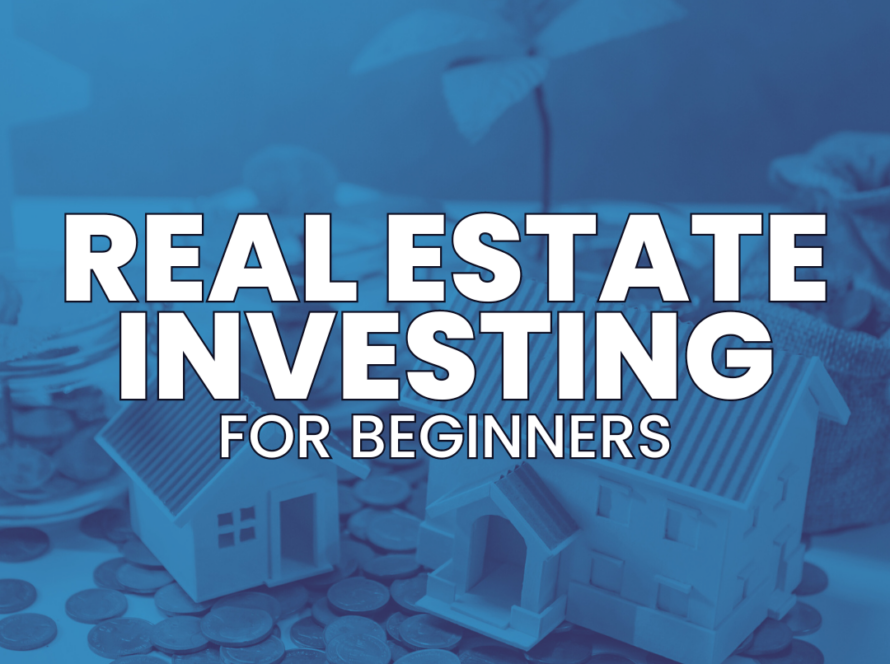Real estate has long been considered one of the most reliable paths to building wealth. The benefits of real estate investing are numerous: passive income, appreciation of assets, tax advantages, and a hedge against inflation, to name a few. But for many beginners, the perceived high cost of entry can be discouraging.
The good news is that there are real estate investing strategies that allow you to start with minimal capital. In this article, we’ll explore these strategies in depth and provide you with a detailed roadmap to begin your real estate investing journey.
Step 1: Educate Yourself
Before diving into any investment, education is crucial. This is particularly true for real estate investing, where mistakes can be costly.
Here’s how to start:
- Read books on real estate investing:
- “Rich Dad Poor Dad” by Robert Kiyosaki: This book will help shift your mindset about money and investing.
- “The Millionaire Real Estate Investor” by Gary Keller: Offers a comprehensive look at real estate investing strategies.
- “The Book on Rental Property Investing” by Brandon Turner: Focuses specifically on building wealth through rental properties.
- “The ABCs of Real Estate Investing” by Ken McElroy: Great for understanding the fundamentals of real estate investing.
- Attend real estate seminars and workshops:
- Look for free or low-cost events in your area. Many real estate investment associations (REIAs) host regular meetings with guest speakers.
- Be cautious of high-priced “guru” seminars that promise quick riches. Focus on educational events rather than sales pitches.
- Take notes and don’t be afraid to ask questions. The speakers and other attendees can be valuable sources of information.
- Listen to real estate podcasts:
- “BiggerPockets Podcast”: Hosted by Brandon Turner and David Greene, this podcast features interviews with successful real estate investors.
- “Real Estate Investing Today”: Provides daily updates on real estate market trends and news.
- “The Real Estate Guys Radio Show”: Offers insights on real estate investing strategies and market analysis.
- Join online forums and communities:
- BiggerPockets.com: This is one of the largest online communities for real estate investors. Their forums cover a wide range of topics and are great for asking questions.
- Reddit’s r/realestateinvesting: Another good resource for discussions and advice from fellow investors.
- Facebook Groups: Look for local real estate investing groups in your area.
- Take online courses:
- Websites like Udemy and Coursera offer affordable courses on various aspects of real estate investing.
- Look for courses that cover specific topics you’re interested in, such as rental property management or fix-and-flip strategies.
- Some local community colleges also offer real estate investing courses at reasonable prices.
Remember, knowledge is power in real estate investing. The more you learn, the better equipped you’ll be to make smart investment decisions and avoid costly mistakes.
Step 2: Define Your Real Estate Investing Strategy
There are numerous real estate investing strategies, and choosing the right one depends on your goals, resources, and risk tolerance. Here are some strategies that can work well for beginners with limited funds:
1. House Hacking:
This involves buying a multi-unit property, living in one unit, and renting out the others. The rental income can cover your mortgage and expenses, allowing you to live for free while building equity.
Example:
Buy a duplex for $200,000 with an FHA loan (3.5% down). Live in one unit and rent out the other for $1,000/month. This rental income could cover most or all of your mortgage payment.
Pros: Low down payment, live for free, learn landlording
Cons: Living next to your tenants, responsible for property management
2. Wholesaling:
As a wholesaler, you find good deals on properties and then sell the contract to another investor for a fee. This requires no money down but does demand time and effort to find deals and buyers.
Example: Find a distressed property worth $100,000 that the owner is willing to sell for $70,000. Contract the property and then find an investor willing to buy it for $80,000. You make $10,000 without ever owning the property.
Pros: No money needed, potential for quick profits
Cons: Requires hustle, can be inconsistent income
3. BRRRR Strategy:
This stands for Buy, Rehab, Rent, Refinance, Repeat. You buy a fixer-upper, renovate it, rent it out, then refinance to pull out your initial investment. This allows you to recycle your capital for the next property.
Example: Buy a property for $100,000, put $30,000 into renovations. After repairs, it appraises for $160,000. Refinance at 75% LTV to pull out most or all of your initial investment.
Pros: Ability to scale quickly, forced appreciation
Cons: Requires more initial capital, renovation skills or team
4. Real Estate Investment Trusts (REITs):
REITs allow you to invest in real estate without owning physical property. You can start with as little as the price of one share, often under $100.
Example: Invest in a REIT like Realty Income (O) that focuses on commercial properties with long-term leases.
Pros: High liquidity, professional management, diversification
Cons: Less control, potential for lower returns than direct ownership
5. Crowdfunding:
Real estate crowdfunding platforms allow you to invest in properties with other investors, often with low minimum investments. Platforms like Fundrise or RealtyMogul let you start with as little as $500.
Example: Invest $1,000 in a crowdfunded apartment complex development project with an expected 12% annual return over 5 years.
Pros: Low minimum investment, access to large commercial deals
Cons: Less control, potential lack of liquidity
Each of these strategies has its pros and cons. Research each thoroughly and choose the one that aligns best with your circumstances and goals. It’s also important to consider your risk tolerance and time commitment when selecting a strategy.
Step 3: Build Your Network
Success in real estate investing often depends on who you know. Building a strong network can provide you with support, opportunities, and valuable insights. Here’s how to start networking:
- Attend local real estate investor meetings:
- Search for Real Estate Investment Associations (REIAs) in your area. These groups often host monthly meetings with speakers and networking opportunities.
- Come prepared with business cards and a brief “elevator pitch” about your investing goals.
- Follow up with people you meet. The real value often comes from building relationships over time.
- Join real estate investing clubs:
- Many cities have clubs dedicated to real estate investing. These often host educational events and provide networking opportunities.
- Look for clubs that focus on your specific area of interest, such as fix-and-flip or rental properties.
- Volunteer to help organize events or speak about your experiences. This can help you build your reputation in the community.
- Connect with real estate professionals:
- Build relationships with real estate agents, property managers, contractors, and lenders. These connections can be invaluable as you start investing.
- Find investor-friendly agents who understand your goals and can help you find good deals.
- Develop relationships with multiple contractors. Having a reliable team is crucial for renovations and property maintenance.
- Use social media:
- LinkedIn can be great for connecting with other real estate professionals and investors. Join real estate investing groups and participate in discussions.
- Instagram and YouTube are popular platforms for real estate investors to share their experiences and connect with others.
- Twitter can be useful for following real estate news and connecting with thought leaders in the industry.
- Participate in online forums:
- Actively engage in discussions on real estate investing forums. This can help you build your reputation and connect with potential partners or mentors.
- Share your experiences and lessons learned. Teaching others is a great way to solidify your own knowledge.
- Look for opportunities to meet forum members in person at events or local meetups.
Remember, networking is about building mutually beneficial relationships. Always look for ways to provide value to others, not just what you can get from them. Be genuine in your interactions and focus on building long-term relationships rather than quick transactions.
Step 4: Analyze Deals and Markets
Even if you’re not ready to invest yet, start analyzing deals and markets. This will help you develop the skills you need to spot good opportunities when you’re ready to invest. Here’s what to focus on:
1. Learn to run the numbers:
Understand key metrics like cash flow, cap rate, ROI, and ARV (After Repair Value). Practice using online calculators to analyze potential deals. BiggerPockets has a great set of investment calculators.
Example: For a rental property, calculate potential cash flow by subtracting all expenses (mortgage, taxes, insurance, maintenance, vacancy allowance) from expected rental income.
2. Study your local real estate market:
Understand trends in home prices, rental rates, and demographic shifts in your area. Use resources like Zillow Research, ATTOM Data Solutions, and local government data to gather information. Pay attention to factors that could impact property values, such as new developments, changes in local employment, or shifts in zoning laws.
3. Research different neighborhoods:
Each neighborhood has its own dynamics. Learn which areas are up-and-coming and which to avoid. Look at factors like school ratings, crime rates, walkability scores, and proximity to amenities. Drive through neighborhoods at different times of day to get a feel for the area.
4. Attend open houses:
This can give you a feel for property values and help you understand what buyers and renters in your area are looking for. Pay attention to features that add value, such as updated kitchens and bathrooms, or potential issues like outdated electrical systems. Use these visits as an opportunity to talk to real estate agents and get their insights on the local market.
5. Practice analyzing deals:
Even if you’re not ready to buy, run the numbers on properties you see listed for sale. Create a spreadsheet to track different properties and their potential returns. Try to reverse-engineer successful deals. If you see a property that was recently flipped, try to figure out the numbers that made it work.
Remember, successful real estate investing is all about buying right. The more you practice analyzing deals, the better prepared you’ll be when it’s time to make your first investment.
Step 5: Start Small and Take Action
The final and most crucial step is to take action. Many aspiring investors get stuck in “analysis paralysis,” continually researching but never taking the leap. Here’s how to get started:
1. Set realistic goals:
- Start with small, achievable goals. Maybe your first goal is simply to buy one rental property within the next year.
- Break down your goals into actionable steps. For example, if your goal is to buy a rental property, your steps might include saving for a down payment, improving your credit score, and viewing at least 10 potential properties.
- Use the SMART framework: Make your goals Specific, Measurable, Achievable, Relevant, and Time-bound.
2. Save for a down payment:
- If you plan to buy property, start saving now. Even small amounts add up over time.
- Consider automating your savings by setting up automatic transfers to a separate savings account.
- Look for ways to increase your income or reduce expenses to accelerate your savings.
3. Improve your credit score:
- A better credit score can help you secure better financing terms.
- Pay down debt, especially high-interest credit card debt.
- Always pay bills on time. Set up automatic payments if necessary.
- Check your credit report for errors and dispute any inaccuracies.
4. Look for creative financing options:
- Consider owner financing, where the property owner acts as the lender.
- Look into partnership opportunities with other investors. You might provide sweat equity while they provide the capital.
- If you own a home, consider using a Home Equity Line of Credit (HELOC) to fund your investment.
- Research local government programs that might offer assistance to first-time investors or for investments in certain areas.
5. Start with a small investment:
- If you’re not ready for a property, consider investing in a REIT or real estate crowdfunding platform. This allows you to start with a small amount and learn as you go.
- Consider a small “house hack” by renting out a spare room in your current home.
- Look for opportunities to partner on a deal, perhaps by finding the deal or managing the property while someone else provides the funding.
Remember, every successful real estate investor started somewhere. The key is to start small, learn from your experiences, and gradually scale up your investments as you gain knowledge and confidence.
Conclusion
Real estate investing for beginners doesn’t have to be overwhelming or require a large amount of capital to start. By following these five essential steps – educating yourself, defining your strategy, building your network, analyzing deals and markets, and taking action – you can begin your journey in real estate investing, even with limited funds.
The benefits of real estate investing are numerous, from passive income to long-term wealth building. While it does require effort and patience, with the right approach, real estate can be an accessible and rewarding investment strategy for beginners.
Begin your education today, and you’ll be well on your way to becoming a successful real estate investor. The journey of a thousand miles begins with a single step, and your first real estate investment could be the first step towards financial freedom.
Are you ready to take your first step into real estate investing? What strategy appeals most to you? Share your thoughts and questions in the comments below, and let’s start a discussion about beginning your real estate investing journey!




